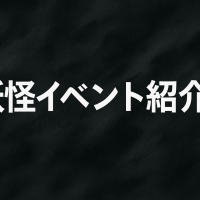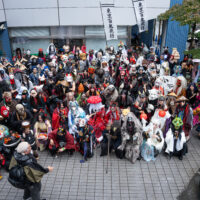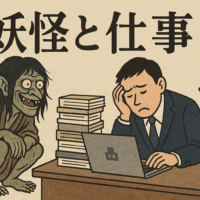
Considering the modern definition of "yokai" from the popularity of Yokai Watch
Speaking of monsters
Recently, Level 5Yokai WatchAmong children,
"Speaking of Yokai, Yokai Watch"The current situation is as follows.
For some of the yokai freaks who read this blog,
That (Yokai Watch) is like a Pokemon, and is different from real yokai!
I'm sure there are people out there who think this way, I'm sure.
I was one of those people, but when I was watching Yokai Watch with my kids,
There are some parts that pay homage to the original yokai, and some that are completely original.
Even if they are monsters, the naming rules are just puns.
There are certain phenomena that cannot be explained by everyday science, and they are called "monster scandals."
The definition is quite solid and concise.
I'm impressed that someone could come up with a Level 5 monster.
So, I have never studied folklore at university, nor have I read any literature on monsters.
I haven't searched much, but I've found a lot about yokai.
Let's go a little deeper into the definition.
First, a general definition of a monster
I'm wondering whether the definition of Enryo Inoue, a pioneer in yokai research, can be applied generally.
Enryo-sanReal mysteryAs such, yokai cannot be explained by modern science.
oftrue mystery,A monster that actually appears as a result of natural phenomenaofFalse mysteryClassified as.
FurthermoreIllusionThe main cause of the problem was misunderstanding.misidentificationyear,
artificially inducedfake monsterClassified into
Among the things currently recognized as yokai,
In terms of percentage, it seems that 50% are fake and 30% are false.
In other words, most of the phenomena are scientifically explained or involve people.
It seems to be a lie.

Also, according to the definition of a yokai by Professor Kazuhiko Komatsu, an authority on yokai folklore, in his book "Introduction to Yokai Culture":
Among the things people find strange when they meet
The yokai (things) as phenomena and the yokai (things) as existences are integrated into
I think it's something that's considered a category.

Purchase here
About the modern yokai boom
I'm sure even Enryō couldn't have predicted the modern yokai boom.
If we define it too clearly, there won't be any such thing as monsters.
Because of the fake ghosts, they were called fox-possessed or dog-gods and were treated like ostracized people.
There are people who have received this treatment, so there are not only good aspects to being a fake monster.
On the other hand, Kazuhiko Komatsu said, "Pikachu has crossed borders, so
In his book he said that even "Mikoshi Nyudo" crosses borders.
In fact, the Yo-kai Watch boom is surpassing that of Pokemon.
Jibanyan appeared on Aomori's Nebuta floats, and the festival stalls at Tomioka Hachimangu Shrine were covered in Yo-kai Watches.
It's only a matter of time before we cross the border.
I would like to consider how this yokai boom has changed the definition of yokai in the past.
I thought about it.
Blame it on the monsters
For example, there is a monster called "Mudazukai" in Yokai Watch.
This is simply a matter of the environment in which one grew up and the individual's personality.
It is a monster that embodies the "common phenomenon" that occurs.
What I want to say is that I have been able to clarifyBlame it on the monstersAnd
I focused on the part where the responsibility was shifted to a third party.
According to Enryo's definition, these are monsters that have been artificially created.fake monster
In his book, Kazuhiko Komatsu describes them as "Yokai as entertainment."
They are called "fake monsters," but I think they are entertainment monsters.
I believe that it evolved independently and created the boom.
Now and in the past, children (and adults) tend to rebel when responsibility is forced upon them.
In the past, adults would hit children on the head with a lot of force.
Maybe I was trying to make him listen.
In today's world, people are concerned about what others think of them due to issues such as abuse and neglect.
Parents who can't speak up to themselves or other children, and people around them who are strangely soft on their children
I think that's the case.
However, once it is determined that something is "the fault of the monsters," in most cases there is no resistance.
You can control your kids well!
"○○-chan, have you been possessed by Mudazukai? Let's use it carefully next time!"
By admonishing them, the child will not feel as if he or she has been directly scolded.
It's easy to just say "yes."
It is especially effective for children going through a rebellious phase!
In today's world, where there is so much information, children's wisdom (and cunning)
The speed at which self-esteem develops is incomparable.
Sometimes it's important to scold them directly,
Try not to scold them too much unless their life is in danger or they are causing trouble to others.
You may need wisdom to control your children well.
Adults need to adapt to the times while keeping up with the wisdom of children
You have to grow up.
summary
So, from my perspective, the current trend in defining yokai is as follows:
Fake monster/tentative monsteris rising againWhile incorporating Pokémon elements
It has become more entertainingWe can say that.
Specifically, they blame "common phenomena" in daily life on "youkai"
It's a convenient definition.
It does have a bit of a money-making vibe to it, but that's only natural.
Of course, there was also an element of artificial conflict of interest.
The essence of the matter remains the same from the past to the present. (That's why we call it a re-emergence.)
This time I have touched on the entertainment value of the product, but there are other features as well.
Since there are elements that are unique to the modern era, I would like to write an article about it from a different perspective.
Finally, let me give you an example using the Yo-kai Watch characters.
・Someone who talks a lot = Nagabana
・Accidental fart = Scoundrel
・ Revealing a secret = Bakuro-baba
・Refuse to do something that is asked of you = Murikabe
One by one, why does it happen?
It is not possible to explain this to children psychologically or scientifically.
But when you start blaming it on monsters, it becomes quite strange.
Children are happy to listen to what you say. In exchange for money (like Yokai Watch character goods)! (laughs)
Lament
In this way, fake monsters came to prominence, and monsters became entertainment.
Of course it becomes "less scary" because it needs to be popular with kids.
It may only be a matter of time before the image of yokai as scary disappears.
But still, I want to continue to share the stories of scary monsters.
From the Yokai Watch boom to Japanese culture itself, including classic yokai
I hope that more children will become interested.
Level 5 and Bandai, you seem to be rushing too much into sales in that area.
Please do something about it! (laughs)











No comments yet.